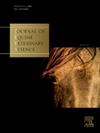Effect of protein acetylation on capacitation of stallion sperm
IF 1.3
3区 农林科学
Q2 VETERINARY SCIENCES
引用次数: 0
Abstract
Sperm capacitation is considered the main factor limiting conventional in vitro fertilization (IVF) in horses. A recent scientific breakthrough in sperm processing for IVF in horses has resulted in embryos and foals being produced; however, various aspects of the IVF process remain to be fully elucidated. Lysine acetylation has been shown to play a role in sperm capacitation in several species and the objective of this study was to detect and evaluate this process in the horse. Ejaculates of two stallions were collected and incubated in different conditions with deacetylase inhibitors to induce a hyperacetylation state. Although lysine acetylation was successfully detected in all experimental groups, sperm hyperacetylation could not be induced following incubation with deacetylase inhibitors. In addition, no hyperactivation was detected by kinematic sperm evaluation and tyrosine phosphorylation increased only in the positive control group. Treatments with high doses of deacetylase inhibitors increased acrosome reaction indicating a possible connection between induction of acrosome reaction and protein acetylation. Future studies investigating the effect of longer incubation periods with different doses of deacetylase inhibitors are warranted to elucidate the ability of protein acetylation to induce capacitation of stallion sperm.
蛋白质乙酰化对种公马精子获能的影响
精子获能能力被认为是限制马匹常规体外受精(IVF)的主要因素。最近,用于马匹体外受精的精子处理技术取得了科学上的突破,从而产生了胚胎和小马驹;然而,体外受精过程的各个方面仍有待全面阐明。赖氨酸乙酰化已被证明在多个物种的精子获能过程中发挥作用,本研究的目的就是检测和评估马的这一过程。本研究收集了两匹种马的射精,并在不同条件下用去乙酰化酶抑制剂进行孵育,以诱导高乙酰化状态。虽然在所有实验组中都成功检测到了赖氨酸乙酰化,但精子在与去乙酰化酶抑制剂孵育后无法诱导出高乙酰化。此外,通过精子运动学评估也没有检测到精子的过度活化,只有阳性对照组的酪氨酸磷酸化增加。高剂量的去乙酰化酶抑制剂会增加顶体反应,这表明顶体反应的诱导与蛋白质乙酰化之间可能存在联系。今后有必要研究使用不同剂量的去乙酰化酶抑制剂进行更长时间孵育的效果,以阐明蛋白质乙酰化诱导种公马精子获能的能力。
本文章由计算机程序翻译,如有差异,请以英文原文为准。
求助全文
约1分钟内获得全文
求助全文
来源期刊

Journal of Equine Veterinary Science
农林科学-兽医学
CiteScore
2.70
自引率
7.70%
发文量
249
审稿时长
77 days
期刊介绍:
Journal of Equine Veterinary Science (JEVS) is an international publication designed for the practicing equine veterinarian, equine researcher, and other equine health care specialist. Published monthly, each issue of JEVS includes original research, reviews, case reports, short communications, and clinical techniques from leaders in the equine veterinary field, covering such topics as laminitis, reproduction, infectious disease, parasitology, behavior, podology, internal medicine, surgery and nutrition.
 求助内容:
求助内容: 应助结果提醒方式:
应助结果提醒方式:


